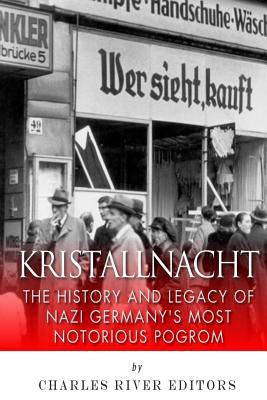
- Retrait gratuit dans votre magasin Club
- 7.000.000 titres dans notre catalogue
- Payer en toute sécurité
- Toujours un magasin près de chez vous
- Retrait gratuit dans votre magasin Club
- 7.000.0000 titres dans notre catalogue
- Payer en toute sécurité
- Toujours un magasin près de chez vous
Kristallnacht
The History and Legacy of Nazi Germany's Most Notorious Pogrom
Charles River
Livre broché | Anglais
12,95 €
+ 25 points
Description
*Includes pictures *Includes accounts of Kristallnacht written by eyewitnesses *Includes footnotes and a bibliography for further reading *Includes a table of contents "It did not take long before the first heavy grey stones came tumbling down, and the children of the village amused themselves as they flung stones into the many coloured windows. When the first rays of a cold and pale November sun penetrated the heavy dark clouds, the little synagogue was but a heap of stone, broken glass and smashed-up woodwork." - Eric Lucas' description of the destruction of a synagogue during Kristallnacht On the 40th anniversary of Kristallnacht, Germany's night of broken glass, then chancellor of Germany Helmut Schmidt spoke of its legacy, "The German night, whose observance after the passage of forty years has brought us together today, remains a cause of bitterness and shame. In those places where the houses of God stood in flames, where a signal from those in power set of a train of destruction and robbery, of humiliation, abduction and incarceration- there was an end to peace, to justice, to humanity. The night of 9 November 1938 marked one of the stages along the path leading down to hell." The hell that Schmidt spoke of was the persecution and attempted elimination of the Jewish people from Europe itself as envisioned by Adolf Hitler and the Nazi leadership he brought to power in Germany during the 1930s. On the night of November 9, 1938, an organized show of force against Jewish businesses and private homes occurred throughout German cities and recently annexed territories in Austria and the Sudetenland. This night would mark a turning point in the lives of not only Jews but all people of the time, marking a clear new path of violence, destruction, and persecution for Jews throughout Europe in the years to follow. Though German Jews had been discriminated against in many forms for as long as the German nation existed, Kristallnacht is widely viewed as the key point in the chronology of Jewish persecution, and many historians consider it to be the beginning of the Holocaust itself. With the condoned and even coordinated violence of Kristallnacht, a new and unprecedented era of anti-Jewish sentiment and action began. The name Kristallnacht is in itself controversial. The origin of the term, which translates as the night of crystal or the night of broken glass, is unknown. There has been conjecture that the Nazi propaganda minister, Josef Goebbels himself, coined the term, but there is now considerable concern in Germany over anything that might seem to make light of or minimize the events of the Holocaust, so the name Kristallnacht is not favored. Instead, the November Pogrom or Reich Pogrom is the preferred term amongst German historians. As Walter Pehle, German professor of Nazi history, warns, "It is clear that the term Crystal Night serves to foster a vicious minimalizing of its memory, a discounting of grave reality: such cynical appellations function to reinterpret manslaughter and murder arson and robbery, plunder, and massive property damage, transforming these into a glistening event marked by sparkle and gleam." Rabbi Benjamin Blech sees the acceptance of the term as a way to "verbally embrace the very heresy that abetted the Holocaust" and likens it to "murder by euphemism." In fact, the Nazis themselves referred to the attacks as the "Jew Action". Though they would describe the event as a spontaneous response of good Germans who could no longer stand the intrigues of the Jews in their midst, Reichskristallnacht, or the November pogrom, was not only allowed but fueled and encouraged by Nazi leaders in an effort to remove the Jews politically, economically, socially, and even physically from German life and culture. Kristallnacht: The History and Legacy of Nazi Germany's Most Notorious Pogrom analyzes one of the most controversial events in pre-war Germany.
Spécifications
Parties prenantes
- Auteur(s) :
- Editeur:
Contenu
- Nombre de pages :
- 48
- Langue:
- Anglais
Caractéristiques
- EAN:
- 9781505709902
- Date de parution :
- 24-12-14
- Format:
- Livre broché
- Format numérique:
- Trade paperback (VS)
- Dimensions :
- 152 mm x 229 mm
- Poids :
- 77 g

Les avis
Nous publions uniquement les avis qui respectent les conditions requises. Consultez nos conditions pour les avis.






